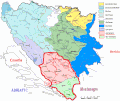Metković
Metković | |
|---|---|
City | |
 Metković Old Town | |
| Country | |
| County | |
| Government | |
| • Mayor | Katarina Ujdur (Most) |
| • City Council | 3 parties |
| Population (2011)[1] | |
| • City | 16,788 |
| • Urban | 15,329 |
| Time zone | UTC+1 (CET) |
| • Summer (DST) | UTC+2 (CEST) |
Metković is a city in the Dubrovnik-Neretva County of Croatia, located in the southeast of the country, on the banks of the river Neretva and on the border with Herzegovina.
Demographics
The total population of the city (municipality) is 16,788 inhabitants (2011), in the following settlements:[1]
- Dubravica, population 90
- Glušci, population 76
- Metković, population 15,329
- Prud, population 497
- Vid, population 796
In the census of 2011, 96.8% of the population self-identified as Croats.[2]
History
The city was first mentioned in a 1422 court document as a small farming town. It remained this way until the nineteenth century. During this period the city found renewed investment from the country's Austrian rulers. With the arrival of the area's first post office and school, as well as the increase of trade with the Ottoman Empire, the city began to flourish. In 1875 Emperor Francis Joseph I visited the city.
Metković is located near the ancient Roman settlement of Narona (today Vid). Narona was established as a Roman trading post, after Rome's successful war[3] (Illyrian Wars) with the neighboring Illyrian tribe Daors (ruins of their main city are located near Stolac), and successfully grew until the 3rd century AD. After that it went on a steady decline especially after a large 4th-century AD earthquake. Upon the arrival of Slavonic tribes in the mid-6th century AD, the city of Narona was abandoned with most parts being covered under silt that was carried by the river Neretva. Only minor excavations were done, most of them being concentrated on the location of Vid. One of the city's landmarks is its Church of St. Elijah, the city's patron saint.[4]
Education
Metković has the following education facilities:
- Primary schools:
- Stjepan Radić Primary school (Croatian language medium school) Osnovna škola Stjepan Radić)[5]
- Don Mihovil Pavlinović Primary school (Croatian language medium school) Osnovna škola don Mihovil Pavlinović[6]
For tertiary education students need to move to another city, the most common destinations are: Dubrovnik (business, management, accounting, music), Split (sciences, management, accounting), Zagreb (music, arts, sciences, applied sciences, engineering, architecture, education, humanities, management, accounting, business), Zadar (humanities, education, early childhood education) and Mostar.
Notable people
See also
References
- ^ a b "Population by Age and Sex, by Settlements, 2011 Census: Metković". Census of Population, Households and Dwellings 2011. Zagreb: Croatian Bureau of Statistics. December 2012.
- ^ "Population by Ethnicity, by Towns/Municipalities, 2011 Census: County of Dubrovnik-Neretva". Census of Population, Households and Dwellings 2011. Zagreb: Croatian Bureau of Statistics. December 2012.
- ^ Wilkes, J.J. The Illyrians, 1992; ISBN 0-631-19807-5
- ^ "Metković". Metkovic.hr. Retrieved 29 November 2015.
- ^ "OS Stjepana Radića". Ossradica-metkovic.hr. Retrieved 29 November 2015.
- ^ [1] Archived 20 February 2006 at the Wayback Machine
- ^ "Srednja škola Metković - Naslovnica". Ssmetkovic.hr. Retrieved 29 November 2015.
- ^ [2] Archived 12 February 2006 at the Wayback Machine
- ^ "Tereza Gabrić". Metkovic.hr. Retrieved 29 November 2015.
- ^ "Lajla Mišur-Volarević". Metkovic.hr. Retrieved 29 November 2015.
- ^ "Dragana Nuić-Vučković". Metkovic.hr. Retrieved 29 November 2015.
- ^ [3] Archived 7 June 2007 at the Wayback Machine
- ^ "Nikola Vučković". Metkovic.hr. Retrieved 29 November 2015.
- ^ Pravednici među narodima: Pera i Stanko Šiljeg





